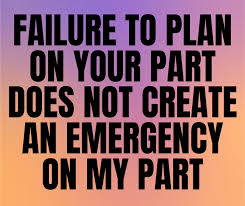This question comes up frequently and just about anyone who has taken an order for custom products has fielded it. Some consultants will confidently assure you that they will definitely have your blinds by a particular date. I know because I’ve lost a sale or three to that type of competitor. I imagine that those potential customers were perplexed as to why I would not match such a guarantee.
Sometimes, I got feedback that the pro had actually come through on the pledge, or so the customer thought. The truth is that the promise was a bet placed – based on typical delivery times.
“I never make a promise unless I know for a FACT that I can keep it!”
A customer once called me in early November for shutters. Back then, the lead time was about 6 weeks.

Customer: “I need them installed by Thanksgiving.”
Me: “I’m sorry but the delivery is about 6 weeks.”
Customer: “That’s ridiculous!!!” (CLICK)
The plain truth
A few producers offer rush services and charge a premium for it. Some offer expedited shipping which will, again, cost you more. Even so, there are numerous variables that can affect your order:
Longer lead times due to unexpected volume
Delays due to holidays
Materials are out of stock due to:
- Unexpected order volume
- Rejection on receipt by quality control
Shipping delays caused by:
- Items damaged or lost in transit
- Extreme weather conditions
- Vehicle accidents
The formerly confident sales person has absolutely NO control over any of these situations, a fact that they will be forced to admit when any of these situations apply.
Customer: “But you promised!”
Sales Person: “Well, you have to understand that I have no control over these events.”
Customer: “But you promised!”
Sales Person: “Well, I couldn’t help it.”
Customer: “But you promised!”
Sales Person: “Well, ….” (struggles for another BS response)
Computer programmers have a name for this:

What the pro CAN do is operate efficiently and place the order with the factory as soon as is practical. In some states, customers have a 3 day cancellation period. It is risky for a retailer to place a factory order during that time because the manufacturers do NOT offer the same leeway. Nevertheless, some customers will urge them to do just that.
Once ordered, the retailer can and should monitor the order status, advising the customer promptly of any delays. On receipt of the order, they should arrange for installation without unnecessary delay.
Ask for whatever guarantee you might but be VERY suspicious if you get one. If you demand a pie-in-the-sky, someone will promise it.
